-
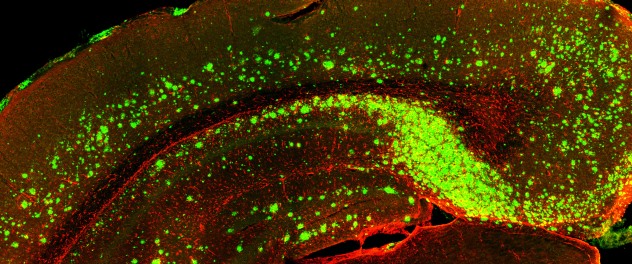
Brain amyloid plaques and gliosis
Section from the brain of a mouse model of Alzheimer's disease showing amyloid-beta plaques (green) and astrocytes expressing glial fibrillary acidic protein (red).
-
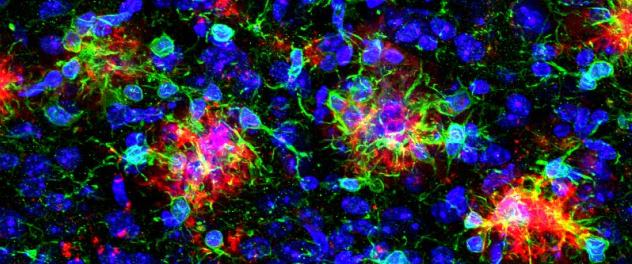
Microglial activation in the Alzheimer's brain
Activated microglia (green) clustering around amyloid beta plaques (red) in the mouse brain.
-
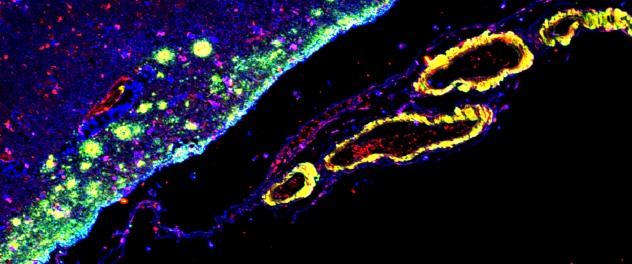
Alzheimer's disease leptomeninges
Cortical leptomeninges from a patient with Alzheimer's disease portraying vascular deposition of aggregated amyloid beta species (green and red).
-
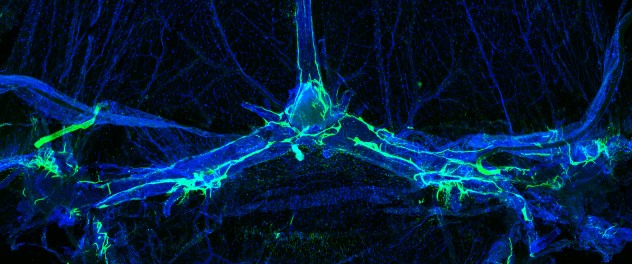
Meningeal lymphatic vessels
Whole mount of mouse brain meningeal tissue showing lymphatic vasculature (green) along the dural venous sinuses.
-
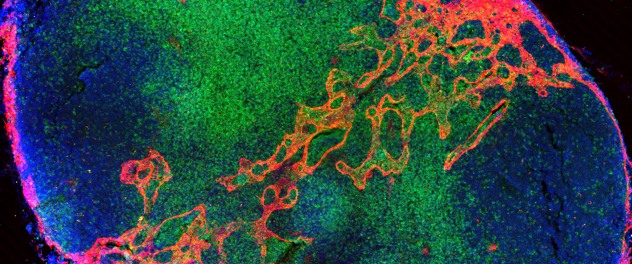
Deep cervical lymph node
Deep cervical lymph node depicting lymphatic vasculature (red) and T cells (green).
Overview
The Meningeal Lymphatics and Neurological Disorders Laboratory is part of Mayo Clinic's Department of Neuroscience on Mayo Clinic's campus in Florida. Led by Sandro Da Mesquita, Ph.D., the lab investigates the role of the meningeal lymphatic vasculature and immunity in brain function, aging and degeneration.
A bona fide lymphatic vascular network is present in the meninges that wrap the brain and spinal cord of different mammalian species, including humans. The meningeal lymphatic system mediates the constant drainage of central nervous system fluids, molecules and immune cells into the cervical lymph nodes. Dr. Da Mesquita and colleagues have found that a progressive decay of meningeal lymphatic drainage with aging underlies cognitive decline and worsens the deposition of toxic amyloid beta peptides in the brain. Dr. Da Mesquita also has spearheaded studies showing that reduced meningeal lymphatic drainage results in deleterious immune and neuroinflammatory responses that contribute to the development of brain pathology and behavioral deficits in models of Alzheimer's disease.
The Meningeal Lymphatics and Neurological Disorders Lab is dedicated to understanding the underlying mechanisms of meningeal lymphatic dysfunction and its implications for the initiation and progression of neurological disorders such as Alzheimer's disease, Parkinson's disease and frontotemporal dementia. By fostering in-house, extramural and international collaborations with other laboratories, the ultimate goal of Dr. Da Mesquita and his team is to develop novel strategies to detect meningeal lymphatic vessel dysfunction in humans and translational therapeutics to delay neurodegeneration and severe cognitive decline by improving lymphatic drainage of the brain.
Dr. Da Mesquita's lab also is closely involved in education, teaching and mentoring of the next generation of medical researchers and is a strong advocate for inclusion and equality. All the members of the lab work together to promote a safe, enjoyable, balanced, motivating and enthusiastic environment for current and future members.
Research focus areas
The multidisciplinary team of researchers that compose the Meningeal Lymphatics and Neurological Disorders Lab tests the overarching hypothesis that exogenous (diet or lifestyle) and endogenous (genetic) factors increase the risk of neurological disease by mediating long-lasting changes in the meningeal lymphatic vasculature and in brain-meningeal immunity. This main hypothesis is being dissected by creative and methodically designed projects and experimental paradigms ongoing in the lab.
To answer defined scientific questions, the team takes advantage of genetically modified mouse models and postmortem collected human brain-meningeal biospecimens and integrates different experimental state-of-the-art techniques. These techniques include in vivo imaging, fluorescence-activated cell sorting, RNA sequencing (bulk or single cell-nuclei) and mass cytometry.
Affiliations
The Meningeal Lymphatics and Neurological Disorders Laboratory is affiliated with other Mayo Clinic research and education areas, including: